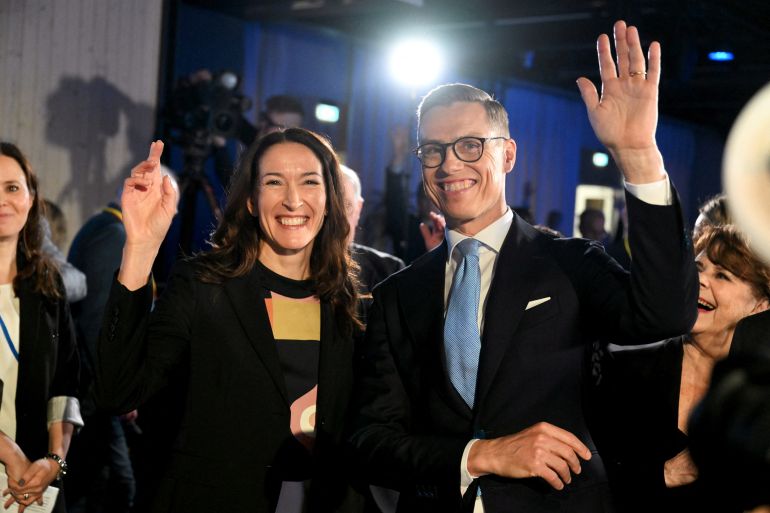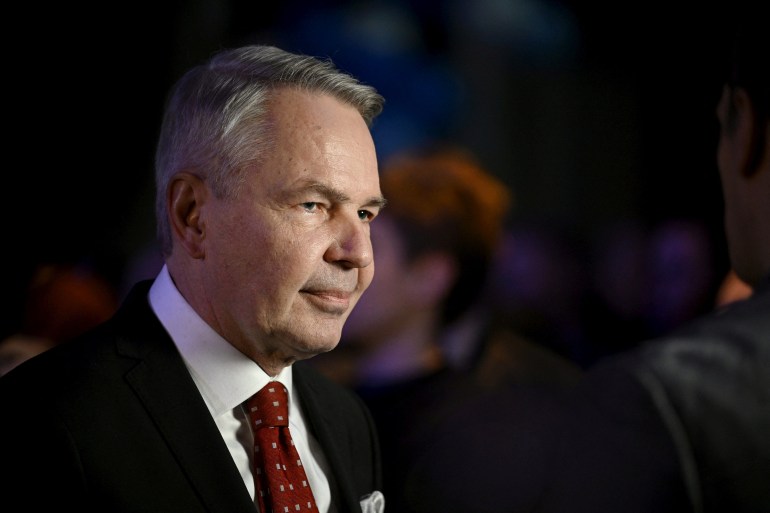Stubb narrowly wins first round of Finland’s presidential election
Alexander Stubb, a former prime minister, and Pekka Haavisto, a former foreign minister, will meet in the second round on February 11.

Alexander Stubb of Finland’s centre-right National Coalition Party has emerged the winner of the first round of the country’s presidential election and will go head-to-head with Pekka Haavisto of the liberal Green Party in a run-off in two weeks’ time.
With all votes from Sunday’s election counted, Stubb had 27.2 percent, followed by Haavisto at 25.8 percent and the nationalist Jussi Halla-aho coming third at 19 percent. Turnout was 71.5 percent.
Keep reading
list of 3 itemsNew NATO member Finland set to pick president after 12 years of Niinisto
‘Voters are looking for a mini-Niinisto’: Finland braces for new president
The top two will go into a final run-off on February 11.
Finland is electing a new president to lead the country in its new role within NATO after it broke with decades of non-alignment to join the Western defence alliance in the wake of Russia’s invasion of Ukraine.
“You know what, we made it to the final, but the competition will only begin now,” Stubb, a former prime minister, told his supporters.
His rival in the second round, former Foreign Minister Haavisto, is a human rights defender who has also worked as a peace negotiator.
Haavisto would become Finland’s first openly gay president if elected.
“Now our task is to reach those whose candidate is not in the second round,” Haavisto said in a speech to his supporters.

War in Ukraine
The role of Finland’s president entails taking the lead on foreign and security policy in close cooperation with the government, representing the country at NATO meetings and acting as commander-in-chief of the Finnish Defence Forces.
The three leading candidates were all supporters of Ukraine and had called for tough measures against Russia.
“Experience in foreign policy could be what people were looking for, looking at the two who will go to the next round,” Hanna Ojanen, the research director of politics at Tampere University, told the AFP news agency as the results became clear.
During their electoral campaigns, both Stubb and Haavisto steered towards the political middle, while Halla-aho maintained his right-wing conservative profile.
For many Finns, nationalist Halla-aho is a divisive figure who attracts both loyal supporters and staunch opponents.
In Helsinki, one advance voter, 26-year-old Leena Boksha told the Reuters news agency it was particularly important to vote in the election because of the war in Ukraine and the difficult situation created by it.
Boksha said Stubb, seen by Finns as a cosmopolitan pro-European, was the right person to head the country’s foreign policy at this time.
“I voted Alexander Stubb because I think he’s very good at dealing with other countries and he has a good relationship with people outside Finland,” said Boksha, who was out with her baby to accompany a friend to vote on Sunday.
Jere Markkinen, a 22-year-old student in mechanical engineering, took a different view.
“I don’t think he [Stubb] would be a very good president because he doesn’t seem like he wants to represent the people, he wants to represent himself,” Markkinen told Reuters, adding that he had voted for Haavisto in advance.
“He is experienced in foreign politics and is known for generally acting smart, unlike some other candidates.”
Voter Hannu Kuusitie told AFP that the country needed a president with “leadership” and “humanity”.
“Of course, he must also be tough when necessary,” he added.
Finland’s admission to NATO last year drew threats of “countermeasures” from Russia, with which Finland shares its entire 1,340km long (830 miles) land border.
In December, Finland closed its border with Russia in response to a surge in migrants trying to cross. Moscow denied Finnish charges that it was sending the migrants there.
The Finnish border serves as the external European Union border in the east and represents NATO’s northeastern flank.
The new Finnish president will replace 75-year-old incumbent Sauli Niinisto, who is required to step down after two six-year terms in office.
He earned the nickname “the Putin Whisperer” during his tenure for his role in maintaining close ties with Russia, which had long been a key role for Finnish presidents.